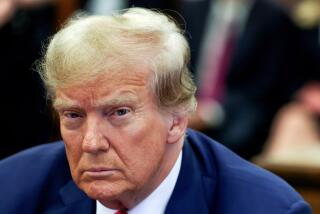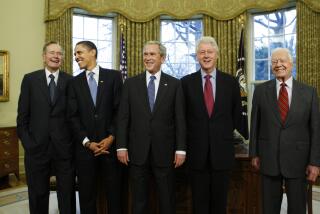TOWER BESIEGED . . .AS BUSH TEAM BUNGLES
- Share via
WASHINGTON — Would someone please turn off the campaign motor at the White House. George Bush has all the makings of a good President but more often he has been acting like a candidate, dashing from one event to the next, improvising a theme a week, elevating style over substance and, most recently, allowing the fight over John Tower to become a high-risk, bloody squabble with the Democrats.
Understandably, his young staff tries to imitate campaign masters like Roger Ailes, Bob Teeter and Lee Atwater: They helped Bush become a highly effective nominee. But a President must be more serious, focusing the nation on long-term goals, driving it steadily toward them. He must build a government that can effectively manage. He must deliver on his policies. And he must do it all with an occasional touch of majesty.
Win or lose on Tower, Bush now stands perilously on the edge of a cliff. He has impressed Congress and the country with his openness, his hands-on, knowledgeable approach and his obvious good will. But there is a deepening sense that something is badly amiss. Some of his most ardent friends furrow their brows and quietly shake their heads, wondering how he can draw back from the precipice.
Seasoned observers began asking early on if the Administration knew where it was going. So far, except on the thrift crisis and elements of a budget plan, it has been extraordinarily vague. As time has dragged on and policies remain in limbo, the questions have been getting tougher: Do these folks know who is coming with them? So far, despite some fine appointments at the top, they have only a shell of a government. At Defense, Bush has 41 key slots to fill that require confirmation and to date he has sent the Senate only two names, one of them Tower. At Transportation, two of 17 names have gone up; at Energy, two of 20; at Interior, one of 18--and the new secretary has been off for 11 days in Guam. The pace, slowest on record, leaves the Administration adrift in many areas. Hence, a third question rises: Do these folks even know what they are doing?
The biggest surprise is how often the White House is surprised. In the Tower affair, no one seemed to understand that a private briefing of Republican senators on an FBI report would infuriate Democrat Sam Nunn of Georgia, chairman of the Armed Services Committee and a well-known stickler for senatorial courtesies. A few days later, the White House was surprised when the committee voted against Tower’s confirmation. Winging toward Japan, staff members were smug--at least three Democrats would come down on their side. No delay, not even a presidential phone call was deemed necessary from Air Force One. Last Sunday, the White House didn’t know in advance that Tower would take an oath to stay cold sober should he become defense secretary.
“The surprised President.” We have heard that before. Republicans remember it as an epithet they hurled with devastating effectiveness against Jimmy Carter, accusing him and his staff of failing to appreciate how the world works.
The Carter team at least had an excuse--they were outsiders new to Washington. The Bush team can hardly advance that argument. Bush, after all, is the pre-eminent insider, the walking resume with 14 years of executive branch service--more than any President since William Howard Taft. In his Cabinet and other key posts are veterans with more than 114 years of experience in past administrations, probably another record. Not counting Tower, six former members of Congress are there to advise; this is the Administration that is supposed to know how to play in the big leagues.
Bush loyalists say they are simply getting their sea legs, that it’s still early; even if the Beltway natives are restless, the new President enjoys the approval of 60% of the general public, exceeding Ronald Reagan at this stage. The future may well vindicate their views but the past lends scant support. Carter learned that if the Beltway crowd turns against you, as it did in the early months of his presidency, those feelings ripple out and can eventually sink a President. To maintain equilibrium through a storm, a President needs a rock-solid core constituency that will stick with him no matter what. When Reagan came to town, he could count upon a reliable ideological base of about 30%-35% of the voters and they sustained him through the recession of 1981-82. Neither Carter nor Gerald R. Ford had a natural core constituency and were tossed about in every gale. While Bush may be riding high with the public today, the evidence suggests that he does not yet have a solid base and that favorable views of him are lightly held, based mostly on his attractive style. His first 100 days in office are crucial to begin building core support.
Typically, fingers point in every direction. For the press, the villain du jour is White House chief of staff John H. Sununu. Should Tower fail, Sununu will be blamed for mishandling relations with Congress and for traveling with Bush when he might have tended the nomination battle back home. (It will be interesting to see how much credit he will be given if Tower wins.) The more serious question is whether Sununu is falling into the Don Regan trap, hesitating to bring in a top-flight staff and spending so much time at the President’s side that he can’t break away to devise and execute strategy. An exceptionally bright man, Sununu will presumably learn quickly from early blunders. Meanwhile, whispers even rise among some Republicans in Congress about Bush himself, questioning his wisdom in forcing them to defend Tower and his slowness in forming a government.
In the end, it doesn’t really matter who made what mistakes. What matters is whether the Administration appreciates its precarious position and swiftly moves to right itself. The White House currently plans to recover from the Tower fight by putting Bush on the road every two or three days to sell his program, campaign style. That’s a mistake. If he hits the road again, does he really have anything to say? Not much, to judge by his last road trips at home. Moreover, Bush has already proved that he is a man of prodigious energy, but he is moving around so much that he’s exhausting his staff and making people nervous. Even the Secret Service has nicknamed him “the Mexican jumping bean.”
What’s needed is for Bush to show the same self-discipline he has in the past when faced with difficulties. He needs to ettle down in the White House for a while and concentrate on personnel and policy, giving his government more coherence. His recruiters say that the appointments process is bogged down by paper work and FBI clearances. Surely, the President can slice through that thicket by raising hell with the system.
The White House must also ensure that policy-making is on track. In his first speech to Congress, Bush promised that a major review of national security and defense issues would be completed by May 10. There are signs of the process falling behind, handicapped by a lack of players from the departments. But within the next few weeks, leaders in other nations--not to mention the press--will begin to expect imaginative, well-considered answers.
On both personnel and policies, Bush would serve himself well if he lifted his sights. There is a tendency within the Administration to think the main task on jobs is simply to fill the vacant slots. But the White House would be greatly strengthened if a few heavyweights from the past came in on a temporary basis, giving the more junior players now there more time to catch hold.
Bush had a first-class campaign because, as manager Atwater boasted, it was run by 23 senior veterans from past campaigns. Strikingly, not one of those veterans joined Bush at the White House. The theory was that Bush wasn’t a terribly good campaigner--that he needed such help--but he would be such a pro as President that he didn’t need them. Wrong. Noone can master the presidency alone. The current White House is leaving it up to Bush to carry the ball on every play, when in fact, he needs and deserves as much help as in the campaign.
Because financial resoures are limited, the Administration has felt compelled to make only modest legislative proposals. Instead of overarching themes, it has pursued what one insider calls “a little agenda” of small changes in education, housing, the environment and the like. Even those proposals have been presented with so little sustained fanfare that the press isn’t paying much attention. As a result, Bush seems highly reactive, a President chained to his in-box. In these early days, it’s the out-box that counts.
For years, Bush has shied away from what he has called “the vision thing,” but he needs to overcome his misgivings and adopt a larger view of what he wants to achieve. Surely he wants to do more than manage problems as they come and surely the country needs more, too. In a nation where 3,000 kids drop out of school every day and where foreign indebtedness increases by $300 million a day, a President has a huge canvas upon which to paint. Bush doesn’t need a lot of money to rally the country to greatness; he needs only a sense of clarity and urgency about the nation’s future.
Once the White House knows where it wants to go, it can more easily formulate public strategy. At the moment, it is being nibbled and nicked to death by small stories because the Administration is generating so few big stories to dominate the news. The Tower fight would have been major news in any Administration but it has been allowed to escalate beyond all proportion. Bush has been absolutely right to stick by his man and defend the powers of his office against ambitious Democrats. A victory would be an obvious boost for him. But he has taken an enormous gamble putting so much personal prestige on the line and letting the process drag on so long.
Few in Washington relish the prospect of a weak presidency. There is a gathering consensus in both parties that the country needs an effective leader. Congressional Democrats may insist upon greater parity with the White House but as they know, four of the last five Presidents left office with enormous frustration and despair; over that period, the United States suffered a relative decline in world power. How can we respond to Soviet changes or compete against rising powers in Japan and Europe if its own Capitol is in a mess?
Much of Washington would like to see George Bush succeed. Republicans are fond of him and the First Lady, who has made a smashing impression. Democrats for a change appear happy as the congressional party and, once beyond Tower, seem disposed to work with Bush. The question from the Tower affair is whether the White House has learned from early mistakes and misfortunes. If so, they can still pull back from the cliff--but they had better hurry.
More to Read
Get the L.A. Times Politics newsletter
Deeply reported insights into legislation, politics and policy from Sacramento, Washington and beyond. In your inbox twice per week.
You may occasionally receive promotional content from the Los Angeles Times.










